unit12
- 格式:doc
- 大小:48.00 KB
- 文档页数:2
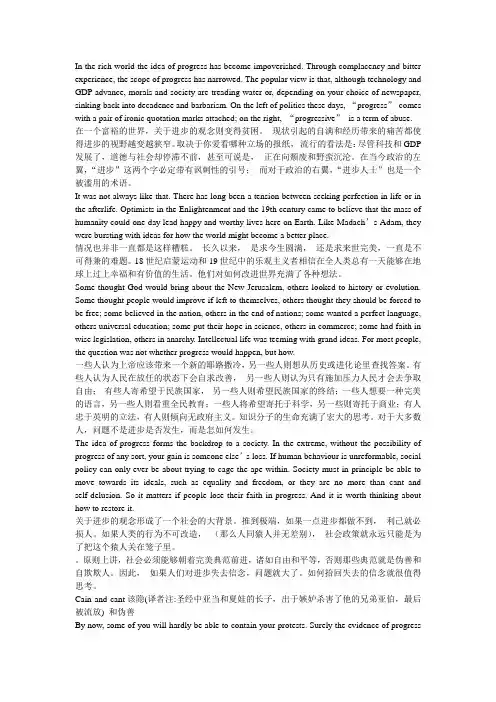
In the rich world the idea of progress has become impoverished. Through complacency and bitter experience, the scope of progress has narrowed. The popular view is that, although technology and GDP advance, morals and society are treading water or, depending on your choice of newspaper, sinking back into decadence and barbarism. On the left of politics these days, “progress”comes with a pair of ironic quotation marks attached; on the right, “progressive”is a term of abuse. 在一个富裕的世界,关于进步的观念则变得贫困。
现状引起的自满和经历带来的痛苦都使得进步的视野越变越狭窄。
取决于你爱看哪种立场的报纸,流行的看法是:尽管科技和GDP 发展了,道德与社会却停滞不前,甚至可说是,正在向颓废和野蛮沉沦。
在当今政治的左翼,“进步”这两个字必定带有讽刺性的引号;而对于政治的右翼,“进步人士”也是一个被滥用的术语。
It was not always like that. There has long been a tension between seeking perfection in life or in the afterlife. Optimists in the Enlightenment and the 19th century came to believe that the mass of humanity could one day lead happy and worthy lives here on Earth. Like Madach’s Adam, they were bursting with ideas for how the world might become a better place.情况也并非一直都是这样糟糕。
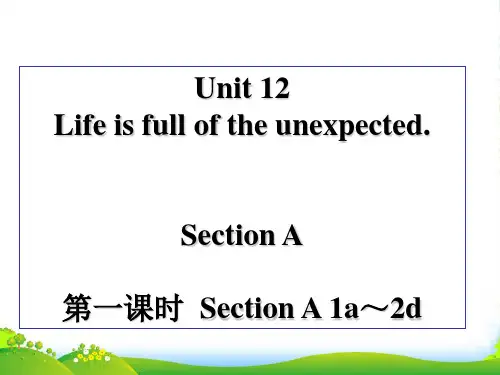
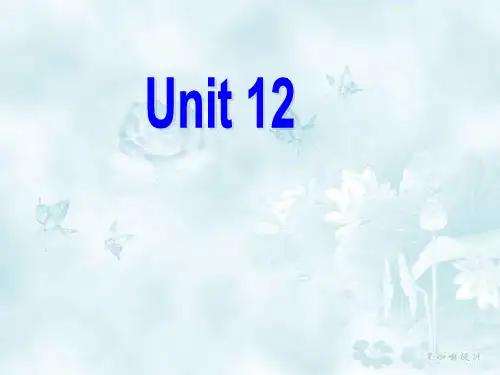
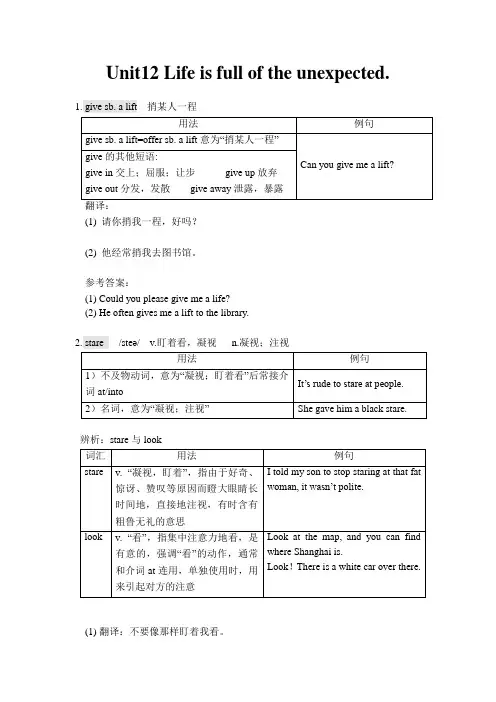
Unit12 Life is full of the unexpected.1. give sb. a lift 捎某人一程(1) 请你捎我一程,好吗?_______________________________________________________________ (2) 他经常捎我去图书馆。
_______________________________________________________________ 参考答案:(1) Could you please give me a life?(2) He often gives me a lift to the library.2. stare /steə/ v.盯着看,凝视n.凝视;注视辨析:stare与look(1)翻译:不要像那样盯着我看。
___________________________________________________________________ (2) Emily ____ the young man hard and finally shamed him into giving up his seatto the old lady.A. stared onB. stared atC. stared forD. stared with参考答案:(1) Don’t stare at me like that.(2) B3. above /əˈbʌv/ prep.在...上面adv.在上面辨析:above,on与over选词填空:above/on/over(1)The plane is flying _____ the clouds.(2)There are five books _____ the desk.(3)There is a bridge _____ the river.(4)I hope the price of the dress will not be____$20.参考答案:(1)above (2)on (3)over (4)above4. burn /bɜ:n/ v.着火;燃烧burn--burnt / burned--burnt / burned辨析:burn, burned与burning(1)翻译:燃烧的旅馆位于城市中心。
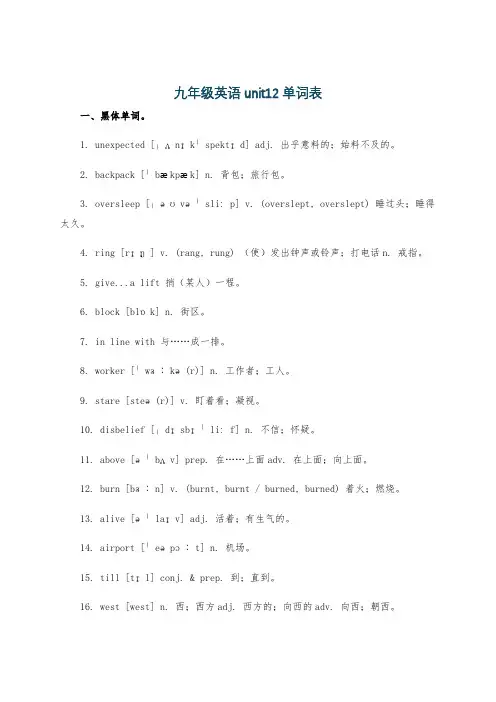
九年级英语unit12单词表一、黑体单词。
1. unexpected [ˌʌnɪkˈspektɪd] adj. 出乎意料的;始料不及的。
2. backpack [ˈbækpæk] n. 背包;旅行包。
3. oversleep [ˌəʊvəˈsliːp] v. (overslept, overslept) 睡过头;睡得太久。
4. ring [rɪŋ] v. (rang, rung) (使)发出钟声或铃声;打电话n. 戒指。
5. give...a lift 捎(某人)一程。
6. block [blɒk] n. 街区。
7. in line with 与……成一排。
8. worker [ˈwɜːkə(r)] n. 工作者;工人。
9. stare [steə(r)] v. 盯着看;凝视。
10. disbelief [ˌdɪsbɪˈliːf] n. 不信;怀疑。
11. above [əˈbʌv] prep. 在……上面adv. 在上面;向上面。
12. burn [bɜːn] v. (burnt, burnt / burned, burned) 着火;燃烧。
13. alive [əˈlaɪv] adj. 活着;有生气的。
14. airport [ˈeəpɔːt] n. 机场。
15. till [tɪl] conj. & prep. 到;直到。
16. west [west] n. 西;西方adj. 西方的;向西的adv. 向西;朝西。
二、白体单词。
1. by the time 在……以前。
2. gotten [ˈɡɒtn] v. (get的过去分词)得到。
3. fool [fuːl] n. 蠢人;傻瓜v. 愚弄。
4. costume [ˈkɒstjuːm] n. (特定种类的)服装;(统指)服装。
5. embarrassed [ɪmˈbærəst] adj. 窘迫的;害羞的。
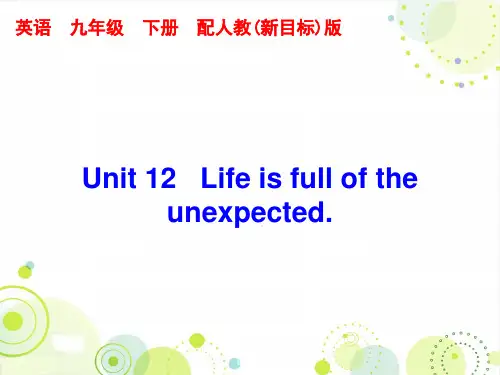
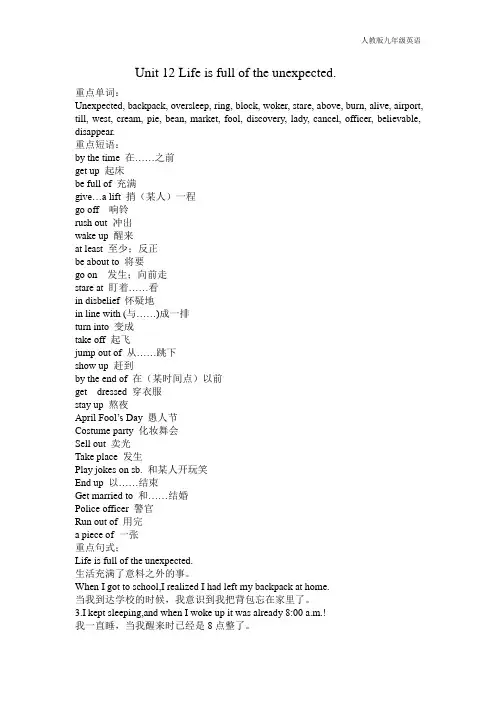
Unit 12 Life is full of the unexpected.重点单词:Unexpected, backpack, oversleep, ring, block, woker, stare, above, burn, alive, airport, till, west, cream, pie, bean, market, fool, discovery, lady, cancel, officer, believable, disappear.重点短语:by the time 在……之前get up 起床be full of 充满give…a lift 捎(某人)一程go off 响铃rush out 冲出wake up 醒来at least 至少;反正be about to 将要go on 发生;向前走stare at 盯着……看in disbelief 怀疑地in line with (与……)成一排turn into 变成take off 起飞jump out of 从……跳下show up 赶到by the end of 在(某时间点)以前get dressed 穿衣服stay up 熬夜April Fool’s Day 愚人节Costume party 化妆舞会Sell out 卖光Take place 发生Play jokes on sb. 和某人开玩笑End up 以……结束Get married to 和……结婚Police officer 警官Run out of 用完a piece of 一张重点句式;Life is full of the unexpected.生活充满了意料之外的事。
When I got to school,I realized I had left my backpack at home.当我到达学校的时候,我意识到我把背包忘在家里了。
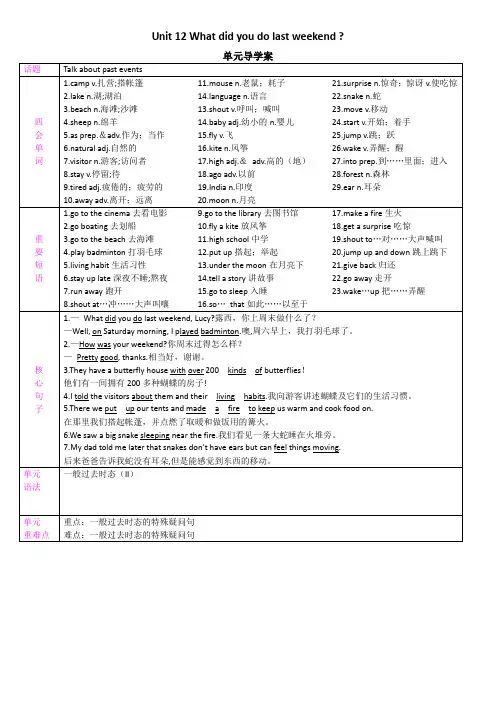
Unit 12 What did you do last weekend ?第一课时Section A (1a~2d)自主预习案学生自学新单词(教材P67-68),比一比,看谁记得又快又准。
1.camp v.扎营;搭帐篷ke n.湖;湖泊3.beach n.海滩;沙滩4.sheep n.绵羊5.as prep.&adv.作为;当作6.natural adj.自然的7.visitor n.游客;访问者8.tired adj.疲倦的;疲劳的9.stay v.停留;待学生自查并写出本课短语(教材P67-68),读一读,记一记。
1.go to the cinema 去看电影2.go boating 去划船3.go to the beach 去海滩4.play badminton 打羽毛球5.living habit 生活习性6.stay up late 深夜不睡;熬夜湖边野营Step 1 情景导入Teacher:How was your last weekend?Student1:It was very good.Teacher:What did you do last weekend?Student 1:I milked the cows.Teacher:What did you do last weekend?Student 2:I visited my grandmother.…环节说明:由师生问答的形式直接引出本节课要学的语言目标一般过去时态,简单明了,直奔主题。
Step 2 完成教材1a-1c 的任务1.教师领读1a中的单词或词组,学生跟读并且识记,然后两人一组互相提问。
2.认真观察图片,将图片和1a中所给的短语匹配,集体核对答案,完成1a。
3.大声朗读图片中的小对话,为听力训练做好准备。
4.认真听录音,根据听力内容在每张图片上填上事情发生的时间morning, afternoon和evening。
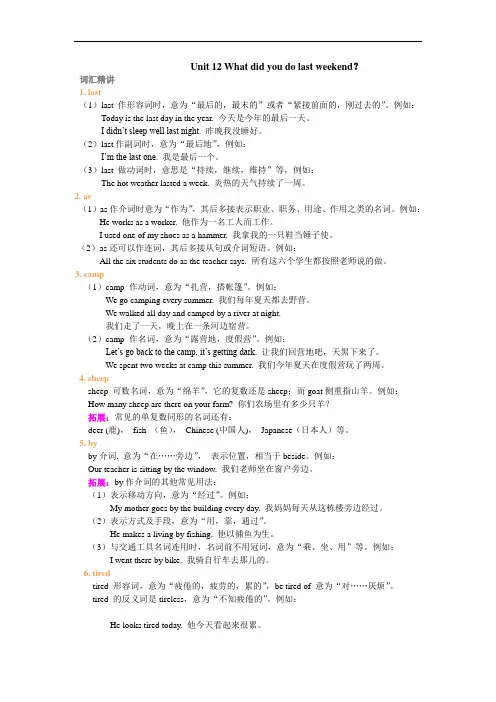
Unit 12 What did you do last weekend?词汇精讲1. last(1)last 作形容词时,意为“最后的,最末的”或者“紧接前面的,刚过去的”。
例如:Today is the last day in the year. 今天是今年的最后一天。
I didn’t sleep well last night. 昨晚我没睡好。
(2)last作副词时,意为“最后地”,例如:I’m the last one. 我是最后一个。
(3)last 做动词时,意思是“持续,继续,维持”等,例如:The hot weather lasted a week. 炎热的天气持续了一周。
2. as(1)as作介词时意为“作为”,其后多接表示职业、职务、用途、作用之类的名词。
例如:He works as a worker. 他作为一名工人而工作。
I used one of my shoes as a hammer. 我拿我的一只鞋当锤子使。
(2)as还可以作连词,其后多接从句或介词短语。
例如:All the six students do as the teacher says. 所有这六个学生都按照老师说的做。
3. camp(1)camp 作动词,意为“扎营,搭帐篷”。
例如:We go camping every summer. 我们每年夏天都去野营。
We walked all day and camped by a river at night.我们走了一天,晚上在一条河边宿营。
(2)camp 作名词,意为“露营地,度假营”。
例如:Let’s go back to the camp, it’s getting dark. 让我们回营地吧,天黑下来了。
We spent two weeks at camp this summer. 我们今年夏天在度假营玩了两周。
4. sheepsheep 可数名词,意为“绵羊”,它的复数还是sheep;而goat侧重指山羊。
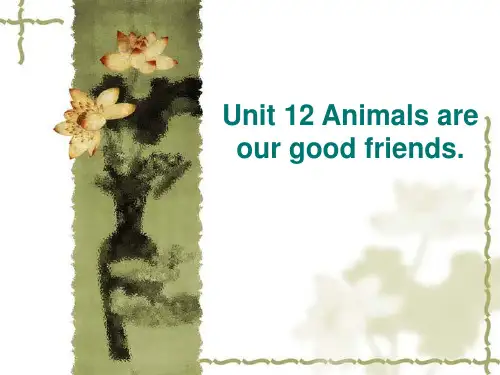
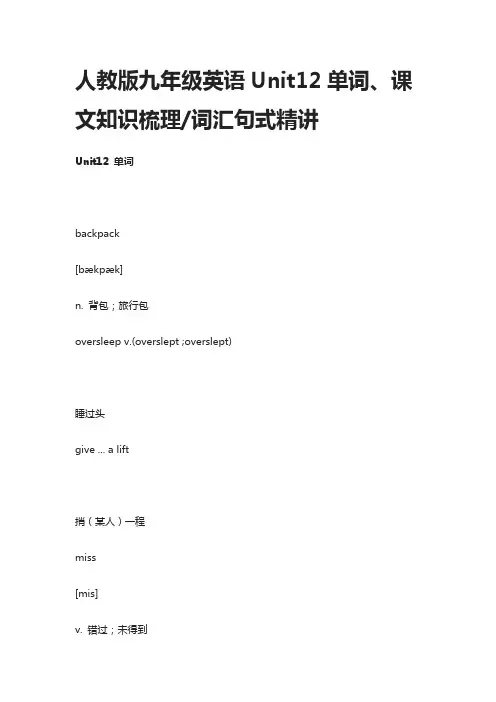
人教版九年级英语Unit12单词、课文知识梳理/词汇句式精讲Unit12 单词backpack[bækpæk]n. 背包;旅行包oversleep v.(overslept ;overslept)睡过头give ... a lift捎(某人)一程miss[mis]v. 错过;未得到unexpected[ʌnikspektid]a.出乎意料的;始料不及的block[blɔk ]n. 街区worker[wə:(r)kə(r)]n. 工作者;工人stare[steə]v. 盯着看;凝视disbelief[disbili:f]n. 不信;怀疑above[ əbʌv]adv. 在上面;向上面pre在上面burn[bə:(r)n]v. (burnt; burned ) 着火;燃烧alive[ əlaIv]adj. 活着;有生气的take off(飞机等)起飞;匆忙离开till[til]conj. & pre到;直到west[west]adv. 向西;朝西adj. 向西的;西部的n. 西;西方cream[kri:m]n. 奶油;乳脂boss[bɔs]n. 老板;领导pie[pai]n. 果馅饼;果馅派course[kɔ:(r)s]n. 课程bean[bi:n]n. 豆;豆荚[ma:(r)kit]n. 市场;集市costume[kɔstju:m]n.服装;装束embarrassed [imbærəst] adj.窘迫的;害羞的announce[ ənauns]v. 宣布;宣告spaghetti[spəgeti]n. 意大利面条hoaxn. 骗局;恶作剧discovery[diskʌvəri]n. 发现;发觉lady[leidi]n. 女士;女子officer[ ɔfisə]n.军官;官员believable[bili:vəbl]adj.可相信的;可信任的embarrassing[imbærəsiŋ]a. 使人害羞的(难堪的或惭愧的)New Zealand[nju:zi:lənd]新西兰Italy[Itəli]意大利Mars[ma:(r)z]火星Carl[ka:(r)l]卡尔(男名)OrsonWelles[ɔ:(r)sən; welz]奥森•韦尔斯Unit12 知识梳理【重点短语】1. take a shower洗浴2. leave my backpack at home 把背包忘在家里3. get back to school 返回学校4. start teaching 开始教学5. go off 响铃6. rush out the door 冲出房门7. give sb a lift 捎某人一程8. miss both events 错过两个事件9. full of unexpected 充满着不可预知性10. be about to do sth 正要做某事11. stare in disbelief at 难以置信地盯着。
Unit 12语法篇感叹句是用来表达人的特殊情感的句子,可以表达人的喜、怒、哀、乐等感情色彩。
感叹句可以是一个单词、一个不定式短语、一个由短语构成的独立句,也可以是由what\how引导的句子,句末常用“!”。
1.what引导的感叹句(1)What+a\an+形容词+可数名词的单数形式+主语+谓语!What a beautiful girl she is!(2)What+形容词+可数名词的复数形式+主语+谓语!What important jobs they have done!(3)What+形容词+不可数名词+主语+谓语!What sweet water it is!2.how引导的感叹句(1)How+形容词或副词+主语+谓语!How interesting the dog is!(2)How+形容词+a\an+可数名词单数形式+主语+谓语!How useful a subject it is!(3)How+主语+谓语!How time flies!3.一些特殊形式的感叹句(1)在陈述句、祈使句或疑问句句尾加感叹号变为感叹句,表示某种强烈的感情。
He runs so fast!(2)用一个词或词组表达强烈感情的句子也是感叹句Wonderful!(3)以there,here等副词开头的感叹句。
There he is!选择疑问句提出两种或两种以上的情况,要求对方选择一种情况回答的问句叫选择疑问句。
选择疑问句中的两种或两种以上的情况用or连接,回答时不能使用yes或no,而要用一个完整的句子或其省略形式。
读选择疑问句时,语调一般是前升后降。
选择疑问句可以分为一般选择疑问句和特殊选择疑问句两种。
(1)一般选择疑问句:一般疑问句+or+被选择部分?--Do you like apples or bananas?--I like apples.(2)特殊选择疑问句:特殊疑问句,+A or B?--Which would you like better,tea or coffee?--Coffee better.单项选择1.__________great courage he showed!A.WhatB.What aC.How aD.How2.__________exciting news it is!A.WhatB.What anC.HowD.How an3.--__________a lovely girl she is!--So she is!A.WhatB.What aC.HowD.How a4.--Do you like listening pop music__________classic music?--Classic musicA.andB.orC.soD.but5.--__________do you like better,football or basketball?--Basketball.A.WhichB.WhereC.WhyD.What单项选择1. __________fast runner she is!A.WhatB.What aC.HowD.How a2.__________great picture!A.WhatB.What aC.HowD.How a3.__________bad weather it is!We can’t go boating.A.WhatB.What aC.HowD.How a4.--Can you tell me it is a dog_________a bear?--A dog.A.andB.orC.soD.but5.--__________do you want to visit,America or Canada?--Canada.A.WhichB.WhereC.WhyD.What单项选择1.__________a beautiful car it is!I have never seen it before.A.HowB.WhenC.WhoD.What2.--__________ it is today!--Yes,shall we go fishing?A.How fine weatherB.What fine weatherC.What a fine weatherD.How fine the weather3.--__________fine day!Shall we go for a walk?--That sounds great!A.WhatB.What aC.HowD.How a4.__________delicious the dish is!A.WhatB.What anC.HowD.How an5.__________ good time we had during the May Day holiday!A.HowB.WhereC.WhoD.What6.Who is your maths teacher,Lee_________Wang?A.andB.orC.soD.but7._________excited they are!A.WhatB.What anC.HowD.How an8.--_________is your maths teacher,Lee or Wang?--LeeA.WhoB.WhatC.WhenD.Where9.--It is said that a foreign teacher will teacher will teach us English next term.--Wow!__________!A.What an excited newsB.What a exciting newsC.How excited the news isD.How exciting news10.--Whose book is it,Lucy’s__________Lily’s?--Lily’sA.andB.orC.soD.but完形填空Probably you have seen photos of the Grand Canyon. But you must go there 1 to feel its size and beauty. The Grand Canyon is one of the greatest 2 wonders of the world.The Colorado River made the Grand Canyon over millions of years. Slowly, the river cut down 3 hard rocks. At the same time, the land was 4 . Today the canyon is very 5 . It’s also very 6 , about 20 kilo-meres. And 7 its height, there are different kinds of plants and animals on both sides of the canyon.The canyon looks different at different times of the day, and 8 different seasons and weather. At sunrise, the red, gold, brown and orange colors of the rocks are 9 clear and bright. Whether you see the Grand Canyon from the top or the bottom, it will be a(n) 10 that you will never forget.1. A. you B. your C. yours D. yourself2. A. natural B. modern C. ancient D. national3. A. along B. through C. across D. past4. A. rise B. rising C. rose D. risen5. A. more B. dangerous C. deep D. low6. A. long B. deep C. high D. wide7. A. as a result B. because of C. thanks to D. thanks for8. A. in B. on C. at D. for9. A. especially B. friendly C. hardly D. differently10. A. interview B. trip C. visit D. experience单项选择:1.__________good advice!A.WhatB.What anC.HowD.How an2.__________bad weather it is!We had better stay at home.A.WhatB.What aC.HowD.How a3.__________sweet music!A.WhatB.What aC.HowD.How a4.Playing games__________much time,I think.A.spendsB.takesesD.pays5.My family usually__________ music at the concert on holiday.A.listenB.hearC.hear ofD.listen to6.Mozart wrote__________piece of music for the classic orchestra.A.hundredB.hundreds ofC.hundred ofD.hundreds7.The boy works_________harder than his elder sister.A.evenB.veryC.prettyD.quite8.Sorry,I can’t play __________ basketball with you this afternoon.My father asked me to stay at home and play __________guitar.A.The,theB.\,\C.the,\D.\,the9.She can sing very well.She has a beautiful __________ .A.soundB.noiseC.voiceD.cry10.He will come here on time,__________?A.won’t heB.will heC.doesn’t heD.is he完形填空:Johnny Sylvester, eleven years old, was in bed in the hospital. A few days ago, when he was __1__in a football game, he fell and his head hit the ground. The doctors thought he might ___2____get well.“He seems to have given up hope. So medicine won’t ___3__. Maybe he needs something else,” said one of the doctors. “When I visit Johnny, all he ever says is that he would like to __4___ Babe Ruth.”To meet Babe Ruth, of course, was not possible. Babe Ruth was as important a man in America ___5___the president himself, and he was the most famous baseball player in the game.The next day Johnny’s father managed to __6__Babe Ruth about the story of Johnny on the phone.Twenty-four hours later, when Johnny lay in his ___7___room, in walked Babe Ruth. Young Johnny couldn’t believe it really was Babe.Babe Ruth sat down at Johnny’s bedside and said, “Now listen, kid, you’ve got to get well. I’ve bought you a new American League baseball. You must start ___8____it”Sylvester just stayed there, saying nothing.For Johnny this was the beginning of a new life, one he thought he would never __9__. To his doctors’ __10__, young Sylvester walked out of the hospital on his own a few weeks later. He was also able to live a healthy life---all because of the present of Babe Ruth.1. A. playing B. swimming C. riding D. growing2. A. always B. often C. usually D. never3. A. win B. do C. eat D. drink4. A. feed B. read C. meet D. defeat5. A. as B. than C. if D. until6. A. say B. speak C. tell D. talk7. A. hospital B. school C. village D. farm8. A. reading B. sweeping C. throwing D. making9. A. refuse B. see C. send D. agree10. A. experience B. opinion C. advice D. surprise阅读理解ASeveral summers ago, Joe Smith, the coach of a football team, and his family were spending their holiday in a small town. One rainy afternoon, it was impossible for them to go out to do anything interesting, so the family decided to go to the cinema. Joe, his wife and their children walked down to the town’s only cinema, bought tickets and went into the hall. The lights were still on, and there were just six other people there. As Joe entered, some of them saw him and started clapping (鼓掌).Joe gave th em a smile and turned to his wife. “Aha, I can’t believe they know me and I’m getting a warm welcome here,” he said, “I guess they saw my games on TV.”They sat down and then a young man came over and reached out his hand to shake hands with Joe. “Thanks a lot,” replied the coach, “I just can’t believe you know who I am.” The man looked puzzled (困惑的). “All I know,” replied the man, “is that they would not show the film until at least ten people bought tickets.”1. Joe and his family decided to go to the cinema because _________.A. they enjoyed seeing films in a small townB. it was impossible for Joe and his team to have a football match that afternoonC. they wanted to try something new for a changeD. nothing else could interest them on a rainy afternoon2. When Joe and his family got to the cinema __________.A. all the tickets had been sold outB. the film had been on for quite some timeC. people in the cinema were waiting anxiously (焦急地)D. everyone in the cinema was clapping3. How did Joe feel when he was given such a warm welcome?A. He felt surprisedB. He felt worriedC. He felt proudD. He felt both surprised and proud4. How many children did Joe have?A. At least oneB. At least twoC. At least threeD. At least five5. Why did the people in the cinema welcome Joe and his family so warmly?A. Because he was the coach of a football teamB. Because he and his family were new-comers in the small townC. Because they had seen Joe’s games on TVD. Because they could not see the film until enough people had arrivedBIn the big cities of Europe and America — London, Paris, New York, people are moving out of the city. They are usually rich families with much money, and they want to live a quieter life. They are tired of the noises and the dirty air of the city, tired of the crowded streets, crowded trains and buses. They don’t want to sit in traffic any more. They want a house with a garden, and clean air that is not polluted.So they move ou t. Some don’t move very far, just a little way out of the city, to the towns near the cities. Other people move to real countryside, with sheep, cows and horses, and green fields! There, they start new lives and try to make new friends.Not all those who move from the city to the countryside are happy. After two or three years, many people feel that it was a big mistake. There isn’t much to do. Country people are very different and aren’talways friendly.As a result, quite a lot of people move back to the city. “It’s wonderful to see crowds in the streets and cinema lights,” they say. “I’m so glad I’m back in the city!”1. Some city people move out of their city because of _____.A. crowds and pollutionB. friendly neighborhoodsC. making moneyD. cows and sheep2. Why do some people move back to the city again? Because _____.A. they can breathe fresh and clean airB. there are big shops and cinema lightsC. they still want to live their city lifeD. they can make many new friends3. Which of the following sentence is wrong according to the passage?A. Many people love their city’s colorful life.B. They enjoy seeing animals in the country.C. All the people move out far from the city.D. Sometimes country people are not friendly.CYou are watching a film in which two men are having a fight. They hit one another hard. At the start they only fight with their hands. But soon they begin hitting one another over the heads with chairs. And so it goes on until one of the men crashes (撞击) through a window and falls thirty feet to the ground below. He is dead!Of course he isn't really dead. With any luck he isn't even hurt. Why? Because the men who fall out of high windows or jump from fast moving trains, who crash cars of even catch fire, are well trained. They do this for a living. These men are called stuntmen. That is to say, they perform tricks (花招,手段). Here are two sides to their work. They do most of the things you see on the screen. For example, they fall from a high building. However, they do not fall on to hard ground but on to empty cardboard boxes covered with a mattress (床垫). Again, when they hit one another with chairs, the chairs are made of soft wood and when they crash through windows, the glass is made of sugar! But although their work depends on trick of this sort, it also requires a high degree of skill and training. Often a stuntman success depends on careful timing. For example, when he is "blown up" in a battle scene, he has to jump out of the way of theexplosion just at the right moment.Naturally stuntmen are well paid for their work, but they lead dangerous lives. They often get seriously hurt, and sometimes killed. A Norwegian stuntman, for example, flew over the edge of a cliff (悬崖) a thousand feet high. His parachute (降落伞) failed to open, and he was killed. Although it is full of deadly dangers, this is no longer the work for men only. Men no longer dress up as women when actresses have to perform some dangerous actions. For nowadays there are stuntman too!1. Stuntmen are those who ______.A. often dress up as famous actorsB. prefer to lead dangerous livesC. often perform dangerous actionsD. often fight each other for their lives2. What’s the meaning of the underlined sentences in the first paragraph?A stuntman should _______.A. crash bravely though a window made of sugarB. do the well-planned activity at a very momentC. open his parachute when he jumps down the cliffD. have got a high degree of skill and training3. Which could probably the best title of this passage?A. Fights in the Movies.B. Crashing Out of the Window.C. Exciting Films Today.D. Most Dangerous Work.。
Unit12. Life is full of the unexpected要点与练习be full of 充满了the unexpected 出乎意料的事by the time到......时候get up 起床get in the shower 洗澡be late for 迟到get back to school 回到学校start teaching 开始上课keep doing sth 一直做某事go off(闹钟)发出响声wake up醒来rush out 冲出去brush one’s teeth刷牙wash one’s face 洗脸give sb a lift 捎某人一程at least (反义:at most 最多)至少find a job 找到一个工作at the World Trade Center 在世贸中心arrive at +小地点/ arrive in+大地点= get to sp. = reach sp. 到达某地be about to do sth即将做某事(一般不接具体的时间状语,表马上要发生)even though= even if 即使;尽管wait in line 排队等候What is going on 发生什么stare at sb凝视某人in disbelief难以置信地;怀疑地feel lucky to do sth 做某事感到很幸运be alive 活着的jump out of 跳出go straight to sp . 直接到某地take off (飞机)起飞;脱下hear about 听说turn into变成turn A into B 把A变成Bshow up 露面,赶到get dressed 穿衣服forget to do sth.忘记要做某事forget doing sth. 忘记做过某事leave sp. 离开某地leave for sp. 动身去某地stay up 熬夜lose weight减肥invite sb. to sp.邀请某人到某地invite sb. to do sth. 邀请某人做某事be embarrassed(主语是人)很尴尬的be embarrassing (主语是物)很尴尬的take place 发生play a joke on sb.跟某人开玩笑play a trick on sb捉弄某人sth. happens to sb.某人发生某事sell out卖光move across 穿越as ... as sb can= as... as possible 尽可能.......地end up doing sth结束做某事end up with sth. 以某事结束end up sth.结束某事get married to sb. 与某人结婚(表短暂动词)be married to sb.与某人结婚(表状态)run away 逃离run away from sp. 从某地逃离lead to 通向miss doing sth. 错过做某事随堂练习1一、请写出下面短语的意思1. by the time _______2. go off ________3. wake up _______4. put on _________5. rush out ________二、单项选择1. Tom drove by and gave me a _____ on the way home.A. flightB. RunC. walkD. lift2. When I got to the cinema, the movie ____ for five minutes.A. beganB. had begunC. had been onD. has been on3. She will be a nurse ____ she graduates from the school.A. by the timeB. at this timeC. at that timeD. at a time4. The alarm is _____. There must something wrong with the car.A. going onB. going byC. going offD. going down5. I ___ this morning and missed the early bus.A. oversleptB. SleptC. heldD. caught三、翻译下列句子1. 当我到学校的时候,我意识到我把书包落在家里了。
Unit 12 Life is full of the unexpected.语法过去完成时1.用法:表示在过去某一时间或动作之前已经发生或完成了的动作,动作发生的时间为“过去的过去”. 它是一种相对的时态,即相对于一般过去时而存在,没有一般过去时就没有过去完成时.He had learned two hundred English words by the end of last term.When they got to the field,the football match had already started.2.过去完成时常用的标志性的时间状语有:by then(直到那时),by last month (直到上个月),by last year(直以去年),还有when,before,after,by the time(直到…的时候)等引导的从句(这些从句都是一般过去时)3.过去完成时的肯定句,否定句和疑问句的构成过去完成时的肯定句的构成是:主语+had+动词过去分词+其他.He had learned two hundred English words by the end of last term.过去完成时的否定句的构成是:主语+had+not+动词过去分词+其他.He hadn’t learned two hundred English words by the end of last term.过去完成时的一般疑问句的构成是:Had+主语+动词过去分词+其他.肯定回答是Yes,主语+had 否定回答是No,主语+hadn’tHad he learned two hundred English words by the end of last term?Yes ,he had./No,he hadn’t选择题(1)She said she more than three hundred stamps.A.will collectB.has collectedC.had collected(2)The student told me she the film twice.A.sawB.has seenC.had seen(3)Lucy in Hong Kong with us by the time her mother called her.A.had arrivedB.has arrivedC.arrives(4)After she her computer, she went to the police for helpA.has lostB.had lostC.lose(5)My brother _____ just ______ doing his homework.A. finishedB. has finishedC. finishesD. is finishing(6)By the time I got to the station,the train.A.had already leftB.leftC.has leftD.would leave(7)Mary all the exercises before her teacher collected the exercise books.A.have finishedB.finishedC.had finishedD.finish(8)When she got ____ the shop, she realized she had _____ her money at home.A.to, leftB.to, forgotC.at, missedD.on, given(9)How long he in the south before he came here?A.has;livedB.had;livedC.does;live用括号内所给动词的正确时态填空(1)You never told me you (see) the professor before.(2)By last month she (read) ten novels.(3)By the time I got to the bus stop, the bus had already _________(leave).(4)We _______(learn)eight units by the end of last week.(5)When I (get) to the cinema,the film (be)on for ten minutes.Section A1. (1)already一般用于肯定句,常与完成时连用He has already finished his homework.(2)yet一般用于否定句和疑问句. Have you finished your lunch yet?My e-mail to you last night.Have you received it ?A.sent;yetB.is sent;alreadyC.was sent;yet2. by the time意为“到……的时候”,引导时间状语从句,主句常用过去完成时。
Unit 12 独立主格分词作状语时,其逻辑主语往往和谓语动词的主语一致。
有时,分词有自己的主语。
这种带主语的分词结构叫做独立主格结构。
独立主格结构由名词或代词加上其他成分构成,在语法上是一个独立的短语,不是句子,在意思上依附于整个句子,具体有以下特点:1.独立主格结构的作用相当于状语从句,可表示时间、原因、条件、行为方式也可以或伴随状况;2.可置于句首,也可以放在句尾;3.主要用于书面语;4.其逻辑主语与句中语法主语不同,不指同一个人或同一事物。
一.独立主格结构的构成1. 名词/主格代词+现在分词。
名词/主格代词与现在分词之间主谓关系。
如:The girl staring at him (= As the girl stared at him), he didn’t know what to say. 姑娘两眼望着他,他不知道说什么好。
Time permitting (= If time permits), we will go for an outing tomorrow. 如果时间允许的话,我们明天去郊游。
2. 名词/主格代词+过去分词。
名词/主格代词与过去分词之间的动宾关系。
如:The problems solved (= As the problems were solved), the quality has been improved. 随着问题的解决,质量已经提高了。
Her glasses broken (= Because her glasses were broken), she couldn’t see the words on the blackboard. 由于眼镜摔坏了,她看不见黑板上的字。
3. 名词/主格代词+不定式。
名词/主格代词与不定式之间是主谓关系,且强调的是一次具体性的动作。
如:He is going to make a model plane, some old parts to help. 借助于一些旧零件,他要做一个飞机模型。
辽师大版五年级上册课文原文及翻译UNIT 12 Unit 12 I like spring第十二单元我喜欢春天Unit 12 I like springListen and say听录音,说一说Spring is a nice season.春天是个美丽的季节。
It's nice and warm.它漂亮又温暖。
In spring, trees are green and flowers are colorful.春天,树绿了,花儿五颜六色。
Birds sing in the trees.鸟儿在树上歌唱。
People go hiking, go camping and fly kites.人们去远足、露营和放风筝。
Spring is a beautiful season.春天是个美丽的季节。
I love spring.我喜欢春天。
season 季节spring 春天summer 夏天autumn 秋天winter 冬天Listen and read听录音,读一读owcow 牛owl 猫头鹰flower 花grow 种植yellow 黄色的The yellow cow and the gray owl are growing flowers.黄色的牛和灰色的猫头鹰在种花。
Let’s play a guessing game.我们来玩猜谜游戏吧。
It’s often sunny.总是阳光明媚。
I wear shorts and T-shirts.我穿短裤和T恤衫。
I go swimming.我去游泳。
Which season is it?是哪个季节?It’s summer.是夏天。
Right.是啊。
I like summer.我喜欢夏天。
Read, think and answer阅读、思考并回答问题Do you know the North Pole?你知道北极吗?Yes.知道。
How many seasons are there at the North Pole?北极有几个季节?Only one, winter.只有一个,冬季。